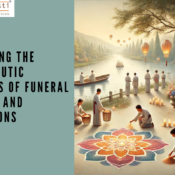
An Essential Guide to Sikhs Funeral Rites
In Sikhism, the journey of life is celebrated with reverence and gratitude, and so is the journey of departure. An Essential Sikh funeral rites, deeply rooted in the teachings of Guru Nanak Dev Ji and subsequent Sikh Gurus, offer a profound and dignified farewell to the departed soul. In this guide, Anthyesti Funeral Services explore the essential aspects of Sikh funeral rites, known as Antim Sanskar, shedding light on the customs, rituals, and spiritual significance associated with honoring the departed.
Understanding Antim Sanskar:
Antim Sanskar, meaning the final rite, marks the culmination of an individual’s earthly journey and the transition of the soul to the next realm. Sikhs believe in the eternal nature of the soul and view death as a natural part of the divine order, embracing it with acceptance and humility.
Pre-Funeral Preparations:
Before the commencement of the funeral rites, several preparations are made by the family and the Sikh community. The body of the deceased is washed and dressed in clean clothing as a mark of respect. Family members gather to recite prayers from the Guru Granth Sahib, seeking solace and strength from the divine teachings.
Rituals and Practices:
- Antam Sanskar Ceremony: The Antam Sanskar ceremony typically takes place at the Gurdwara, the Sikh place of worship. The sacred hymns from the Guru Granth Sahib, known as Kirtan, are recited to offer solace to the grieving family and guide the departed soul on its journey.
- Ardaas: A collective prayer, known as Ardaas, is offered to seek blessings and guidance from Waheguru (God) for the departed soul and the grieving family. It is a deeply emotional and cathartic moment, where the community comes together to offer support and solidarity.
- Cremation or Burial: Sikhs practice both cremation and burial, depending on regional customs and personal preferences. Cremation is often preferred as it symbolizes the return of the physical body to the elements, while burial signifies the integration of the body into the earth.
- Kirtan Sohila: Before the cremation or burial, the Kirtan Sohila, a nighttime prayer, is recited to invoke divine blessings and peace for the departing soul. It is a serene and meditative moment, offering comfort and reassurance to the family and loved ones.
Langar and Seva:
Following the funeral rites, the Sikh community gathers to participate in Langar, a communal meal served in the Gurdwara. Langar embodies the principle of seva (selfless service) and reflects the spirit of equality and inclusivity preached by Guru Nanak Dev Ji. Through the act of sharing a meal, mourners find solace and strength in the collective support of the community.
Coping with Loss:
The Sikh faith emphasizes acceptance and resilience in the face of loss and adversity. While mourning is a natural part of the grieving process, Sikhs are encouraged to find solace in the teachings of the Gurus and the support of the Sangat (community). The recitation of Gurbani (sacred hymns) and meditation on the divine name (Naam Simran) offer spiritual comfort and healing to the grieving heart.
Conclusion:
Sikh funeral rites, rooted in the teachings of compassion, humility, and acceptance, offer a poignant tribute to the departed soul and a source of solace to the grieving family. Through rituals, prayers, and communal gatherings, Sikhs honor the sacredness of life and embrace the eternal cycle of birth and death with grace and reverence.
In times of loss and sorrow, the guiding light of Guru Granth Sahib and the unwavering support of the Sikh community serve as beacons of hope and strength, illuminating the path of those who mourn and offering solace to the departed soul on its journey towards eternal peace.
May the divine grace of Waheguru envelop the departed soul in love and light, and may the teachings of Guru Nanak Dev Ji continue to inspire and uplift humanity with compassion and humility.
Contact us 9883318181
All Categories
- Ambulance (6)
- Anthyesti Biopic Cinema (11)
- Blogs (330)
- Condolences (8)
- Cremation Center (10)
- Cremation Service (58)
- Dead Body Carrier (20)
- Dead Body Freezer Box (49)
- Dead Body Transport (132)
- dead body van (3)
- Death Ceremony (8)
- FAQ (18)
- Freezer box (20)
- Funeral Communities (10)
- Funeral Service (53)
- General (5)
- hearse van service (48)
- Last Rites Pujas (2)
- Last Rites Rituals (10)
- Media Mentions (9)
- Pind Daan (1)
- Pitru Paksha (3)
- Pre Planning Funeral (11)
- Priest Funeral Service (1)
- Shraadh Rituals (3)
- Uncategorized (3)
- Vaikunta Samaradhane rituals (1)
- We are in News (19)





